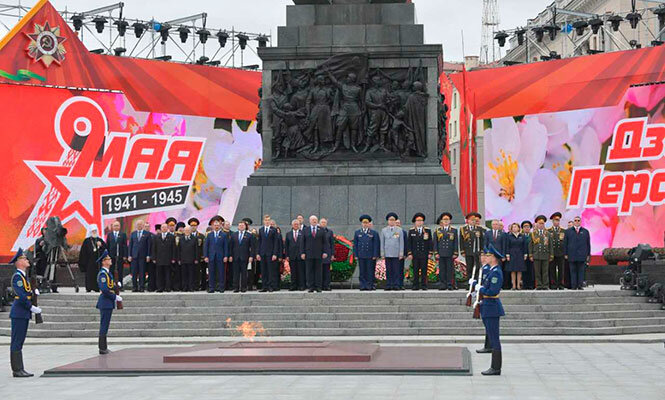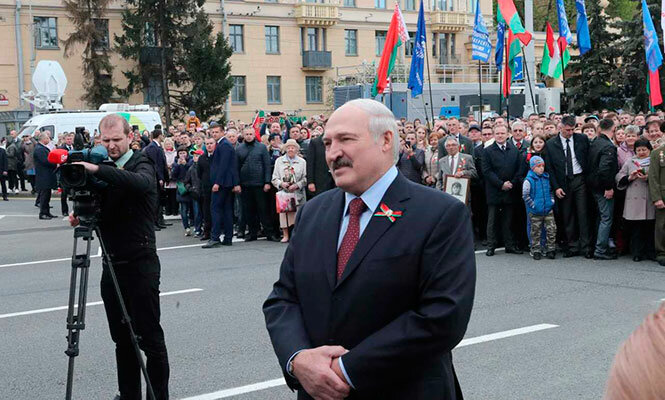Participation in national celebrations in honor of Victory Day
- 30
Belarus President Aleksandr Lukashenko took part in the national festivities in honor of the 74th anniversary of the Victory in the Great Patriotic War on 9 May.
The head of state laid a wreath to the Victory Monument in Minsk. Flowers to the monument were also laid by the sons of the head of state.
The ceremony was attended by leaders of the national government bodies, the National Assembly, courts, the Security Council and the Armed Forces, law enforcement agencies, youth organizations and public associations, the CIS Executive Committee, representatives of the diplomatic corps, the Belarusian Orthodox and Roman Catholic churches.
A minute of silence was observed in tribute to the memory of the people killed during the Great Patriotic War. The Guards of Honor of the Minsk Military Commandant's Office marched past the guests. The event continued with a festive theatrical performance in the Victory Square.
After the event, Aleksandr Lukashenko talked to the veterans of the Great Patriotic War, representatives of the diplomatic corps and the youth.
Activists of the Belarusian BRSM Youth Union showed the President the album “Belarus Remembers” featuring photos and brief stories about their family members who fought in the Great Patriotic War. This album will be taken to different cities and towns of the country where anyone will be able to add the photos of their family members to the album. This book will take its place in the Belarusian State Museum of the Great Patriotic War by the Independence Day.
Aleksandr Lukashenko also talked to mass media. The President said that representatives and heads of the former Soviet Union states should meet more often on Victory Day in Belarus.
“9 May is a holiday for all and, above all, for the Belarusians. We, representatives of former Soviet republics and even heads of state, should meet more often in Minsk, to pay homage to this holy land,” Aleksandr Lukashenko said.

Commenting on media speculations as to why he chose not to go to Moscow, the President said: “I cannot say that nobody came. If the Russians or Russian leadership invited someone and they refused, then you could say ‘nobody came’. But as far as I am concerned: firstly, they did not invite me to Moscow today. Secondly, even if they did it would have been difficult to bring these events apart,” he said.
The head of state underlined that he cannot miss the Victory Day celebrations in Minsk. According to the President, if he missed the festive events in the Belarusian capital, people would have a lot of questions.
Aleksandr Lukashenko noted that Belarus is widely represented at the festive events in Russia. Many ordinary people and officials went there. For example Minsk Oblast Governor Anatoly Isachenko recently visited his hometown in Bryansk Oblast. “I asked him to convey our Russian friends our best wishes, Victory Day greetings. This is the people's diplomacy which the Belarusian President is involved in. This is how things will continue to be,” the Belarusian head of state noted.
We must keep the memory of the Victory and we must teach our children, Belarus President Aleksandr Lukashenko said when asked what needs to be done to preserve the memory of the Great Patriotic War.
“To keep the memory alive, we must not forget and we must teach our children. Where possible, we must show our kids, even the smallest ones, that it is our victory. It is not just the achievement of those who made the victory possible. It is our heritage. We are the heirs of those who did this,” Aleksandr Lukashenko said.
The head of state noted that the theme of preserving the memory of the Great Victory is not a new one, especially for politicians. “Naturally, every year it will be harder to do because time is inexorable. Human memory does not keep everything. We need to think about how to keep the main thing that makes us human, that looks into the future. Victory Day is, of course, one of our symbols,” Aleksandr Lukashenko noted.
Aleksandr Lukashenko underlined the need to take action at the state level, to pass knowledge, experience and memory of the events of the Great Patriotic War from the older generation over to the youth. “The majority of our young people are committed and reliable people,” the head of state said. According to him, during his meetings with young people he often thinks whether they are able to keep the memory of those events. “They are. I am absolutely convinced of this,” President said. Numerous campaigns that take place in Belarus with the participation and at the initiative of young people, in particular Belarus Remembers! which was launched in our country and gained popularity in other states, under different names, add confidence to this. “These campaigns help preserve the memory of those events,” Aleksandr Lukashenko added.
The Belarusian leader stated with regret that the number of war veterans is getting fewer every year. "Those who worked to restore our country after the war, the children of war were neglected a bit. We should not forget about them. They are still alive. They were the witnesses of that war,” the President said.
Aleksandr Lukashenko believes that it is important to involve more actively the young generation in keeping war memorials and military grave sites in order. “Campaigns alone cannot do everything. We ourselves need to do something every day, show it to our children and, what is more important, involve them, too,” the head of state said.

“There are, however, some who, at the suggestion of adults, believe that that was not our victory, that we were the aggressors, and so on. This finds response in the hearts of some of our kids. This is bad,” the President said. The Belarusian leader stressed that it is necessary to take effective measures to preserve the memory of the Great Patriotic War in the country.
Commenting on the security situation in the region and some countries, the President noted that Belarus did not just foresee the development of conflicts in different parts of the world but also experienced some of these events this or that way. He recalled the street protests in the 1990s, attempts to desecrate and demolish the monuments, including the one on Independence Square in Minsk. “We have seen it all. I think it was in 2010 when it was the last attempt at overthrow. Do you remember the storming of the government house? They did not dare to approach the President's residence. We have experienced it all: hybrid attempts, hot clashes, and attempts to overthrow the constitutional order and the current leadership of the country,” the head of state said.
Aleksandr Lukashenko underlined that economic development is the most urgent issue for Belarus today. He noted that if everyone works the way they should, if they set high standards for themselves first and then the country’s leadership, then people will live happily. “It is impossible to bring us to heel or overthrow us. The things that are happening in Venezuela or we saw happen and continue in Syria, Libya and other countries are impossible in Belarus,” Aleksandr Lukashenko said.
According to the head of state, thanks to the unity of the Belarusian people it was possible to put a stop to the protests which could lead to clashes. “We understand that we saved the country then (the big picture is seen from afar). Even if we retire tomorrow, we can tell our kids: this is your country, live calmly and peacefully. Even rich neighboring states are thinking of the heritage that they can leave to the children? We avoided this. We are no longer worried about this. But we need to think about it all the time, we need to keep it in mind,” Aleksandr Lukashenko noted.
The President reiterated that the most important thing for Belarus is economy. “We need to pick up steam faster. Today our destiny is in our hands, and how we live depends only on us,” he said.



























































